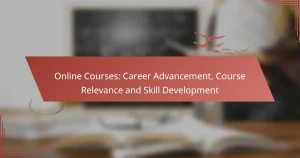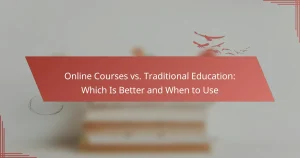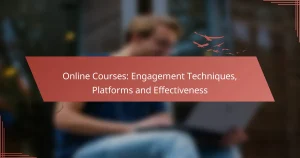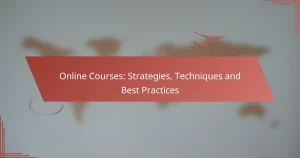Online courses have emerged as comprehensive learning solutions, providing flexible opportunities for professional development across various fields. Platforms like Coursera for Business, edX Professional Certificates, and LinkedIn Learning offer tailored content designed to enhance career growth and meet the evolving demands of industries. By carefully selecting courses that align with your learning objectives and budget, you can access quality education that fits your needs.
Online Courses: Live Sessions, Interaction and Student Outcomes
Online courses that incorporate live sessions create a vibrant learning atmosphere, allowing for real-time interaction and engagement that enhances the educational experience. By fostering active participation and immediate feedback, these…
Online Courses: Career Advancement, Course Relevance and Skill Development
Online courses offer a flexible and effective way to enhance career advancement by equipping individuals with relevant skills tailored to industry needs. With a focus on in-demand areas such as…
Online Courses vs. Traditional Education: Which Is Better and When to Use
As education evolves, the debate between online courses and traditional education intensifies, each offering unique advantages. Online courses provide flexibility and cost savings, making them an attractive option for many…
Virtual Reality: Engagement, Immersion and Learning Effectiveness
Virtual reality (VR) revolutionizes the learning experience by fostering engagement through immersive environments that captivate learners’ attention. By enabling interactive content exploration, VR enhances understanding and retention, making it a…
Online Courses: Selection Evaluation, Beginner Insights and Learning Outcomes
Choosing the right online course is essential for achieving your learning goals, and it requires careful evaluation of factors such as course content, instructor qualifications, and student feedback. Online courses…
Online Courses: Budget Considerations, Time Management and Course Flexibility
When considering online courses, it’s essential to evaluate your budget, including tuition costs and financial aid options, to ensure a suitable fit for your financial situation. Additionally, effective time management…
Online Courses: Flexible Options for Busy Students
Online courses provide an ideal solution for busy students seeking to further their education without sacrificing their existing commitments. With platforms like Coursera and edX, learners can enjoy flexible scheduling…
Online Learning vs. Traditional Education: Which Is Better and When to Use
The debate between online learning and traditional education continues to evolve as both methods offer unique benefits tailored to different needs. Online learning provides flexibility and access to a wide…
Online Courses: Reviews, Credibility and User Feedback
As online education continues to grow, understanding the credibility of courses and the importance of user feedback becomes essential for prospective learners. Reviews play a crucial role in assessing the…
Online Courses: Return on Investment, Cost-Benefit Analysis and Student Value
Online courses offer a compelling return on investment (ROI) by enhancing earning potential and career opportunities. By conducting a thorough cost-benefit analysis, prospective students can weigh the financial and personal…
What are the best online courses for professional development?
The best online courses for professional development include platforms like Coursera for Business, edX Professional Certificates, and LinkedIn Learning. These options provide a range of skills and knowledge tailored to enhance career growth and meet industry demands.
Coursera for Business
Coursera for Business offers a wide array of courses from top universities and organizations, focusing on skills that are in high demand. Companies can subscribe to access a library of courses, enabling employees to learn at their own pace while tracking progress through analytics.
When selecting courses, consider the specific skills your team needs. Popular topics include data science, project management, and digital marketing. Coursera also provides certificates upon completion, which can enhance resumes and professional profiles.
edX Professional Certificates
edX Professional Certificates are designed to help learners gain specific skills through a series of courses. These programs often include hands-on projects and assessments to ensure practical understanding. Many certificates are created in partnership with leading institutions, adding credibility to the credentials.
Participants can expect to invest several months to complete a certificate, typically requiring a few hours of study each week. Fields such as computer science, business management, and healthcare are well-represented, making it easier to find relevant courses for career advancement.
LinkedIn Learning Courses
LinkedIn Learning offers a vast library of courses covering a wide range of professional skills, from software development to creative design. The platform integrates with LinkedIn profiles, allowing users to showcase completed courses to potential employers.
Courses are typically short, often ranging from a few minutes to a couple of hours, making them ideal for busy professionals. Subscriptions are available on a monthly basis, providing flexibility for learners to explore various topics without a long-term commitment.
How to choose the right online course?
Choosing the right online course involves understanding your learning objectives, verifying the course's credibility, and evaluating feedback from previous students. These steps ensure that the course aligns with your goals and offers quality education.
Assess your learning goals
Start by defining what you want to achieve through the course. Are you looking to gain new skills for a job, enhance your knowledge in a specific field, or pursue a personal interest? Clear goals help narrow your options and focus on courses that meet your needs.
Consider the level of expertise you wish to attain. For instance, beginner courses may be suitable for foundational knowledge, while advanced courses can deepen your understanding of complex topics. Align your goals with the course's content and outcomes.
Check course accreditation
Accreditation ensures that a course meets certain educational standards and is recognized by employers and institutions. Look for courses offered by accredited institutions or those that have received endorsements from reputable organizations.
In some regions, such as the EU or the US, accreditation can significantly impact the value of the course in the job market. Verify the accreditation status through official websites or by contacting the institution directly.
Read reviews and ratings
Reviews and ratings provide insight into the experiences of previous students. Check platforms like Course Report or Trustpilot for unbiased feedback. Look for courses with high ratings and positive comments regarding content quality and instructor effectiveness.
Be cautious of overly positive reviews that may seem fabricated. Aim to read a mix of reviews to get a balanced view. Pay attention to comments about course structure, support, and real-world applicability, as these factors can greatly influence your learning experience.
What are the pricing options for online courses?
Online courses typically offer various pricing options to accommodate different learning preferences and budgets. The most common models include subscription plans, one-time payments, and free trials, each with its own advantages and considerations.
Subscription models
Subscription models allow learners to pay a recurring fee, often monthly or annually, for access to a library of courses. This approach is beneficial for those who wish to explore multiple subjects or take several courses over time.
Prices for subscriptions can range from around $10 to $50 per month, depending on the platform and the breadth of content offered. It's essential to evaluate the course quality and the number of available courses before committing to a subscription.
One-time payment courses
One-time payment courses require learners to pay a single fee for lifetime access to a specific course. This model is ideal for individuals who want to focus on a particular skill or topic without ongoing costs.
Prices for these courses can vary widely, typically falling between $30 and $500, depending on the course's depth and the instructor's expertise. Consider checking for any included materials or support when evaluating the value of a one-time payment course.
Free trial offerings
Many online course platforms provide free trial offerings, allowing learners to sample courses before making a financial commitment. These trials usually last from a few days to a month and can give insight into the course structure and teaching style.
While taking advantage of free trials, ensure to note the cancellation policies to avoid unexpected charges. This option is a great way to assess whether a subscription or one-time payment course aligns with your learning goals.
What are the benefits of online learning?
Online learning offers numerous advantages, including flexibility, diverse resources, and cost savings. These benefits make it an appealing choice for many learners seeking to enhance their skills or knowledge.
Flexible scheduling
One of the primary benefits of online learning is flexible scheduling, allowing students to study at their own pace and on their own time. This flexibility is particularly beneficial for those balancing work, family, or other commitments.
Many online courses offer asynchronous learning, meaning you can access materials and complete assignments whenever it suits you. This can lead to better retention and understanding, as learners can revisit content as needed.
Access to diverse resources
Online learning provides access to a wide range of resources, including video lectures, interactive quizzes, and downloadable materials. This variety caters to different learning styles and preferences, enhancing the overall educational experience.
Additionally, students can tap into global knowledge by enrolling in courses from institutions around the world. This exposure can enrich their understanding of subjects and provide insights that may not be available locally.
Cost-effectiveness
Online courses often come at a lower cost compared to traditional education, eliminating expenses such as commuting, housing, and physical materials. Many platforms offer free or low-cost courses, making education more accessible.
When considering online learning, it's important to evaluate the potential return on investment. While some courses may charge higher fees, they often provide valuable certifications or skills that can lead to better job opportunities and higher salaries.
What platforms offer the most comprehensive online courses?
Several platforms stand out for their comprehensive online courses, including Udacity, Skillshare, and FutureLearn. Each offers unique features and focuses on different learning styles and subjects, catering to a wide range of learners.
Udacity Nanodegree Programs
Udacity's Nanodegree programs are designed to provide in-depth knowledge in technology fields such as data science, programming, and artificial intelligence. These programs typically last from a few months to a year, depending on the course load and learner's pace.
Students benefit from project-based learning, mentorship, and career services, which enhance their employability. The cost ranges from a few hundred to a couple of thousand USD, making it a significant investment in one's career.
Skillshare Creative Courses
Skillshare focuses on creative skills, offering thousands of courses in areas like graphic design, photography, and writing. Courses are typically shorter, often ranging from 30 minutes to a few hours, making them accessible for busy individuals.
Membership is subscription-based, allowing unlimited access to courses for a monthly fee. This model encourages exploration of various topics, but learners should be mindful of the quality of individual courses, as it can vary widely.
FutureLearn University Partnerships
FutureLearn collaborates with universities to provide courses that often align with academic standards. These courses cover a broad spectrum of subjects, from humanities to sciences, and can last from a few weeks to several months.
Many courses are free to audit, with a fee for certificates or additional content. This platform is ideal for learners seeking university-level education without the commitment of a full degree program.
What prerequisites are needed for online courses?
Online courses typically require a few essential prerequisites to ensure a smooth learning experience. These include basic computer skills, reliable internet access, and familiarity with the course platform.
Basic computer skills
Basic computer skills are crucial for navigating online courses effectively. This includes understanding how to use a web browser, manage files, and utilize common software applications like word processors and spreadsheets.
Students should be comfortable with tasks such as sending emails, participating in discussion forums, and submitting assignments online. Familiarity with video conferencing tools may also be beneficial, as many courses incorporate live sessions.
To assess your skills, consider creating a checklist: can you open and close applications, save documents, and troubleshoot minor issues? If you find gaps in your abilities, numerous free resources are available online to help you improve.






